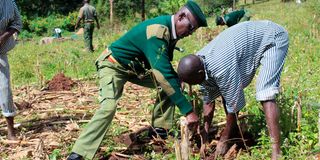Premium
President William Ruto orders relocation of Kitale Prison

President William Ruto, Prime Cabinet Secretary Musalia Mudavadi second (left), and Trans Nzoia County Governor George Natembeya during the Episcopal Ordination and installation of Bishop Odonya as head of Kitale Catholic Diocese on January 21, 2023.
President William Ruto has ordered the relocation of Kitale Prison to create room for the expansion of the densely populated town.
Responding to Trans Nzoia Governor George Natembeya’s request, President Ruto who was speaking during the consecration of Bishop Henry Juma Odonya in Kitale town on Saturday said his administration supports the call for the prison to be removed from the town.
“I have already agreed that the prison which is within the town will be relocated to create space for expansion. I also agree with you leaders that Kitale needs new roads, water and issuance of title deeds and land for expansion,” said Dr Ruto.
The town has four prisons which sit on a 160-acre piece of land. These are Kitale Main, Kitale Medium, Kitale Annex and Kitale Women.
On Saturday, Governor Natembeya questioned the motive of having all the correctional facilities in one town.
In May last year, around 424 individuals and entities, including state institutions, firms and children’s homes were accused of illegally acquiring and encroaching on 2,321.09 acres of Kenya Prisons Service land in Kitale.
The questionable acquisition of the land LR No. Kapkoi/Mabonde Bock 1/EX-Prison- (LR2197/2/2), had put in danger the ownership and security of the state department’s historical assets, worth over Sh2.47 billion.
Documents presented in Parliament then showed that the public land was irregularly acquired over 30 years ago, and has been flagged by Auditor-General Nancy Gathungu in the audited accounts of the State Department of Correctional Services for 2020/21.
Public Accounts Committee
Former Correctional Services Principal Secretary Safina Kwekwe, appearing before the Public Accounts Committee (PAC) of the National Assembly, said the individuals and entities subdivided the land and got titles, but efforts by her department to reclaim it had been hampered by numerous court cases.
Records maintained by the state department reveal that Legal Notice No.359 of 1943 and Legal Notice No.721 of 1961 established Kitale Main Prison and Kitale Medium Prison on land measuring about 3,000 and 159.01 acres respectively.

Senior Sergent Ben Etiang' and one of the prisoners plant indigenous trees at Kitale Prison farm in 2019.
However, a field inspection by officers from the Office of the Auditor-General in October 2021 at both prisons established that about 2,321.09 acres of the Kitale Main Prison farmland “had been alienated and allocated to private individuals, among them senior government officials”.
The auditors noted that upon request by the state department, NLC, through a letter dated September 13, 2018, confirmed that Gazette Notice No.359, declared the plot as prison land with effect from April 1, 1943. “The illegal alienation of prison’s land has been a subject of litigation,” the audit report says.
And the relocation of the Kitale Medium Prison has been pushed by leaders from Trans Nzoia since the reign of Daniel arap Moi, Mwai Kibaki and Uhuru Kenyatta. Dr Ruto’s administration has promised to address the issue including the perennial water shortage in Kitale.
Dr Ruto’s plan for the expansion of Kitale town comes barely months after announcing plans to expand Kericho town by 1,000 acres.
The expansion is aimed at decongesting the town.
"This was part of the charter we signed and I agree with the governor that Kericho is too congested. We have to look for 1,000 acres of land to expand the town,” said President Ruto in October 2022.
In Kitale, the Head of State said he will meet the leaders from Trans Nzoia to develop a collaboration mechanism to ensure even development in the region. He also promised to revive all stalled government projects.
President Ruto, who was accompanied by National Assembly Speaker Moses Wetang’ula, and Prime Cabinet Secretary Musalia Mudavadi among other leaders said his administration will continue to go slow on the capital-intensive development projects until enough money is raised.
Stalled projects
“There are several stalled projects across the country including here but I said we better delay in reviving them because I do not want to develop our country with loans. Even if we delay for two, three, four, six months, let us delay as I plan on how we will get enough revenue to build our country and not on loans,” said President Ruto.
The Head of State also vowed to deal with cartels who he said have been denying the government a lot of money which could go into development through tax evasion.
“When it comes to paying taxes, there is nothing like a big or small person…. there is nothing like you are known or not known, everyone must pay tax. If ordinary Kenyans can pay taxes, the tycoons also have to pay taxes. If they try to evade tax, we will meet head-on,” said Dr Ruto.
The President said his Kenya Kwanza government will not discriminate against any region regardless of their political affiliations.
“I want to assure you that we shall work for all Kenyans, those who voted for us and those who did not, all Kenyans have a right because Kenya is one country where democracy allows us to decide. As leaders, we shall work together without political or regional affiliations, we shall serve all Kenyans,” said Dr Ruto.
On his fertiliser subsidy which is now being piloted in around 12 counties, Dr Ruto said farmers will get the farm input close to their homes in a bid to weed out brokers who take advantage of farmers.





